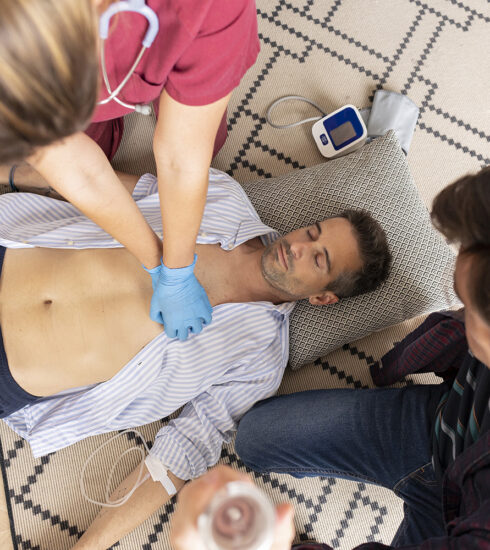Unlock Limitless Opportunities With A Career Shift from RN to FNP
In the dynamic world of healthcare, nurses are at the forefront of patient care, making significant contributions to the well-being of individuals and communities.
Registered Nurses (RNs) bring essential skills and expertise to the field, but many aspire to expand their scope of practice and assume more advanced roles with a career shift into becoming a Family Nurse Practitioner. One transformative path that allows RNs to achieve this goal is by enrolling in a Master of Science in Nursing (MSN) Family Nurse Practitioner (FNP) program.
Why Career Shift from RN to FNP?
The transition from RN to FNP is a significant career move that offers numerous advantages and opportunities. Here are some compelling reasons why RNs choose to pursue this path:
1. Advanced Clinical Practice:
FNPs are advanced practice nurses who provide comprehensive healthcare services to patients of all ages. They are trained to diagnose and treat a wide range of health conditions, prescribe medications, and order diagnostic tests. This advanced clinical practice allows FNPs to take on a more active role in patient care.
2. Expanded Scope of Practice:
FNPs have a broader scope of practice compared to RNs. They can work autonomously and have the authority to provide primary care, manage chronic illnesses, and offer preventive health services. This expanded scope enables them to make a substantial impact on patient health and well-being.
3. Meeting Healthcare Demands:
As the demand for primary care providers continues to grow, FNPs play a crucial role in addressing healthcare disparities and ensuring that patients have access to quality care. They often work in underserved areas, making healthcare more accessible to those in need.
4. Higher Earning Potential:
Transitioning to an FNP role often comes with increased earning potential. FNPs are highly trained professionals, and their specialized expertise is reflected in their salaries.
5. Patient-Centered Care:
FNPs are known for their patient-centered approach to care. They develop long-term relationships with their patients, focusing on holistic health and preventive measures to improve overall well-being.
You can improve patient-centered care even further by considering using a Virtual medical receptionist to answer your calls. This way they will receive personalized support even when you aren’t readily available. Using this service will allow you to provide quality care to all of your patients regardless of your schedule.
Enrolling in an MSN FNP Program
To make the transition from RN to FNP, one must complete an MSN FNP program. Here’s a step-by-step guide to the process:
1. Bachelor’s Degree in Nursing (BSN):
Most MSN FNP programs require candidates to hold a Bachelor of Science in Nursing (BSN) degree. If you already have an associate’s degree in nursing (ADN), consider enrolling in an RN-to-BSN program to meet this requirement.
2. RN Licensure:
Candidates must hold an active RN license to be eligible for an MSN FNP program. This license ensures that you have the foundational nursing knowledge and clinical experience required for advanced practice.
3. Research Programs:
Research MSN FNP programs to find one that aligns with your career goals and interests. Consider factors such as program accreditation, curriculum, faculty expertise, and clinical placement opportunities.
4. Application and Admission:
Apply to the chosen MSN FNP program. Admission requirements typically include transcripts, letters of recommendation, a personal statement, and an interview. Meeting these requirements demonstrates your commitment and readiness for advanced nursing practice.
5. MSN FNP Curriculum:
Once admitted, you will embark on a comprehensive curriculum that includes advanced nursing theory, clinical skills development, and specialized coursework in family medicine. The program prepares you to provide primary care across the lifespan, from infants to older adults.
6. Clinical Practicum:
MSN FNP programs include extensive clinical practicum experiences, where students work alongside experienced FNPs to apply their knowledge and skills in real healthcare settings. These experiences are invaluable for building clinical competence and confidence.
7. Certification and Licensure:
After completing your MSN FNP program, you will be eligible to sit for the national certification exam in family nursing. Passing this exam is a crucial step in becoming a licensed Family Nurse Practitioner.
8. Professional Development:
Once you’ve obtained your FNP certification and licensure, ongoing professional development is essential. Staying up-to-date with the latest medical advancements and best practices ensures that you provide the highest quality care to your patients.
Transitioning from an RN to an FNP is a rewarding journey that opens doors to a more specialized and fulfilling nursing career. FNPs are well-positioned to meet the evolving healthcare needs of our communities, providing patient-centered care that improves health outcomes and enhances overall well-being.
To learn more about the specific MSN FNP programs available and to explore which one aligns with your career goals, consider contacting universities or institutions offering these programs for details.









